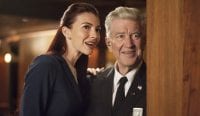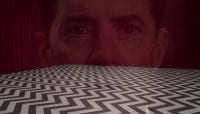Who killed Laura Palmer? A question that was as significant to ’90s TV as any other. The actress tasked with playing the dead homecoming queen, Sheryl Lee, became an instant cult icon. Add Maddy Ferguson and Carrie Page to the list, and the importance of Sheryl Lee to the world of Twin Peaks becomes as vital as the work done by Kyle MacLachlan. “As Seen on Twin Peaks” is back, and Sheryl Lee is the first performer under the spotlight.
This series takes a look at the acting careers of the cast of Twin Peaks – one performer at a time. But instead of looking A-Z through their entire filmography, I’ll be picking out one film to represent each actor, which will be followed by a 10 Questions-style discussion between myself and one of my fellow 25YL staffers about the film and various other credits. Now, the films I’ve picked to be discussed are not necessarily each actor’s most famous role, or most critically acclaimed performance, or biggest box office success. Instead, I’ll be focussing on those hidden gems, overlooked treasures and underrated masterpieces. And, to make things more interesting, each article will feature a range of different perspectives between myself and my guest. Some films will be familiar to the two of us, others might be first-time watches, and some movies will be a completely new experience for us both.
So, once again, join Lindsay Stamhuis and I as we discuss Sheryl Lee, her career, Twin Peaks, Backbeat and more!
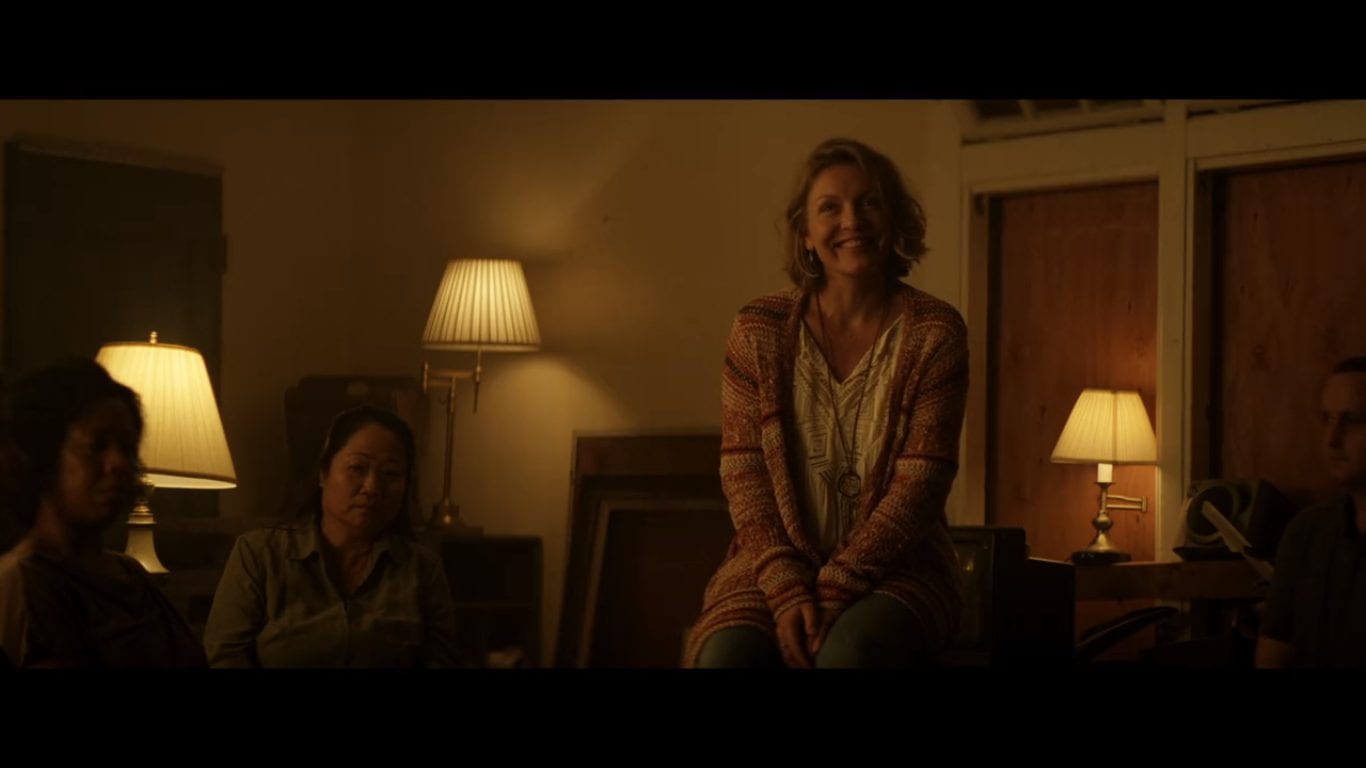
Jon Sheasby: For those who are unaware, it is usually I that picks the performer/film and approaches a guest but it was you, Lindsay, who approached me about covering Sheryl Lee in Backbeat. I know you’re a huge fan of The Beatles, and this was my first viewing of the film, so I presume you’ve been a fan of Iain Softley’s movie for many years?
Lindsay Stamhuis: Oh yes, absolutely. I can’t remember when I first watched it, but I’m going to take a guess that it was around 2002. I am a big Beatles fan and I remember very distinctly going through a major resurgence period in my love for their music at that point. “When I was just 17…” Haha. I can’t quite put my finger on what it was that I loved so much about it, but I guess I thought it captured what I imagined the Hamburg-Kaiserkeller/Liverpool-Cavern Club days to be.
JS: I was really hooked by the film, particularly being that I’ve never been that big of a fan of The Beatles, so I came to Backbeat with no real knowledge of their history beyond what is commonly known. Like our previous conversation about Kyle MacLachlan in The Doors, it seems like Backbeat wasn’t that well-received by the surviving members of the band, but it was generally liked by critics. For you, where does this film rank among the other Beatles-based films such as Nowhere Boy?
LS: I think Backbeat takes its subject matter far less earnestly than Nowhere Boy did but didn’t have as much fun with it as a film like Across the Universe did, and I do prefer the kind of impressionistic touch that that film had with the subject matter (while most Beatles fans have an intense dislike for Across the Universe). If a surviving member of The Beatles disliked the film I suspect it was because it didn’t flatter him very well, and so he didn’t think it did a charitable enough job of telling the story the way he remembers it (how very Lost Highway!) But that doesn’t make it any more or less “true.” I guess what it comes down to for me as a viewer is that I watch this film and I feel like I’m there. It doesn’t have to be exactly what happened; the feeling is what I’m after. This is why I think Nowhere Boy, while better received than Backbeat, falls so short for me.
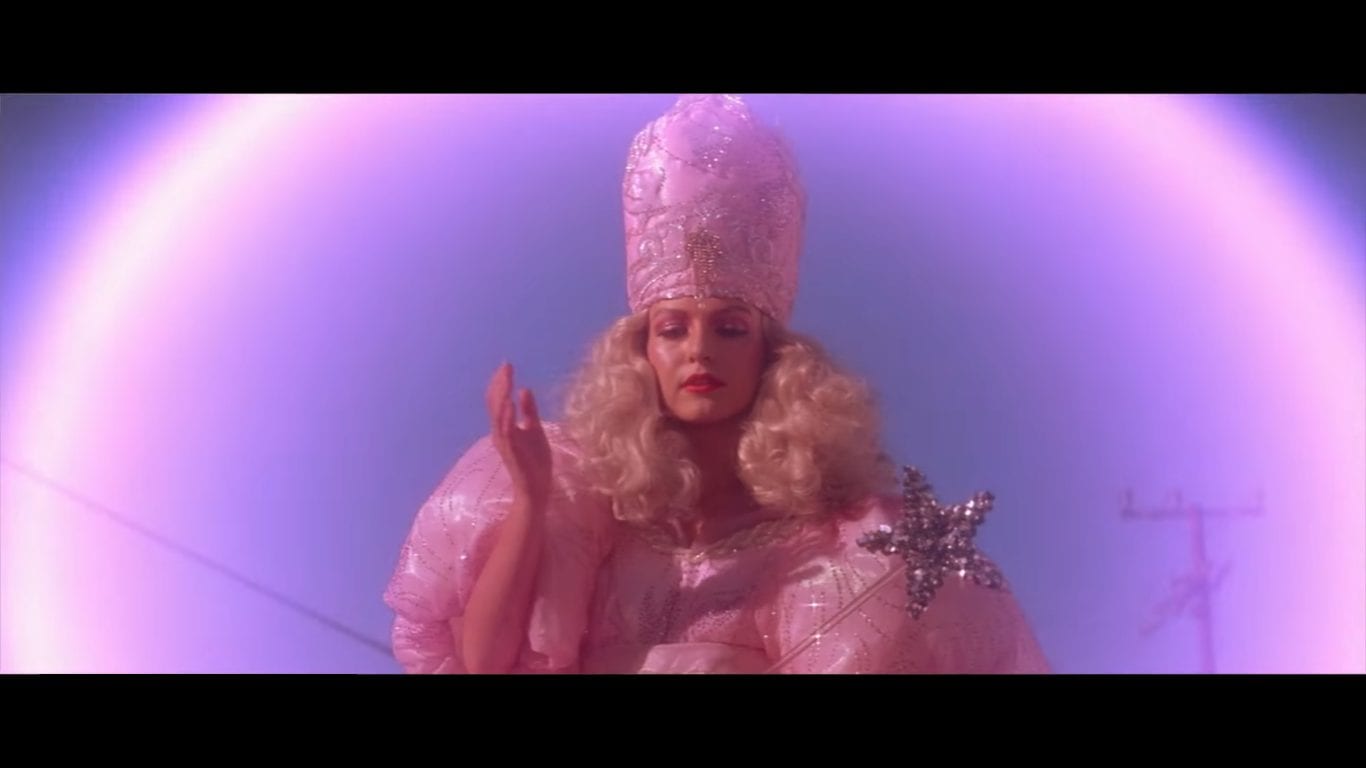
JS: Even though Backbeat wasn’t greeted that warmly by the former members of The Beatles, Astrid Kirchherr was reportedly very pleased with the outcome and Sheryl Lee’s portrayal of her. So, in your opinion, how did Sheryl Lee do as the German photographer and artist?
LS: Well! I love Astrid Kirchherr, first of all. I think she’s brilliant and cool and I love her photography and the influence she had on The Beatles in those early days, and I admire her for not trying to capitalise on their fame like others might have. Having said that I’ve never seen her in anything other than still photos, so I don’t know if Sheryl Lee captured the nuances of her character or not. But I love the flirtatious energy she brought to the screen, especially in her interactions with Ian Hart’s John Lennon. She looks a lot like Astrid too – though slightly prettier in that peculiar Hollywood way, of course. And I will always remember Astrid finding Stu’s body, and that scream… my god, Sheryl Lee can scream, and not just as Laura Palmer, though that is totally Laura Palmer’s scream right then, isn’t it?! There was so much raw emotion there. Fiction supplanting reality.
JS: She can scream alright! I thought she was great as Kirchherr, and I’m continually impressed by her range the more and more I delve into her filmography. Everyone reading this already knows about her superb performance in Twin Peaks: Fire Walk With Me, but she’s done a bunch of fine work throughout her career that has – for the most part, unfortunately – gone under the radar. She’s clearly an incredibly gifted performer, so why do you think her career never quite broke out like it did for someone like Heather Graham? It is something as obvious as typecasting, especially when you take the unfortunate Desperate Housewives recasting into consideration?
LS: I think Heather Graham had this sexy, cool, girl-next-door vibe that was very superficial. I don’t mean that in a bad way, it’s just that this is what people wanted as the ’90s became more and more bubblegum-lite. Spice Girls and Aqua’s “Barbie Girl,” right? I think Sheryl’s appeal went deeper and fit with projects like Backbeat that weren’t box office draws but were more thoughtful arthouse-style films. Heather Graham was perfect as Felicity Shagwell in Austin Powers: The Spy Who Shagged Me… and I’m not sure Sheryl Lee would have played bubbly in that way, or as convincingly. I feel like there’s something beneath the surface, behind her eyes, that would have made it impossible for her to play bubbly like that. And maybe that’s a bit of typecasting so that probably plays a role as well. I also have read that she had some significant health issues that might have contributed to her career not taking off the way others did.
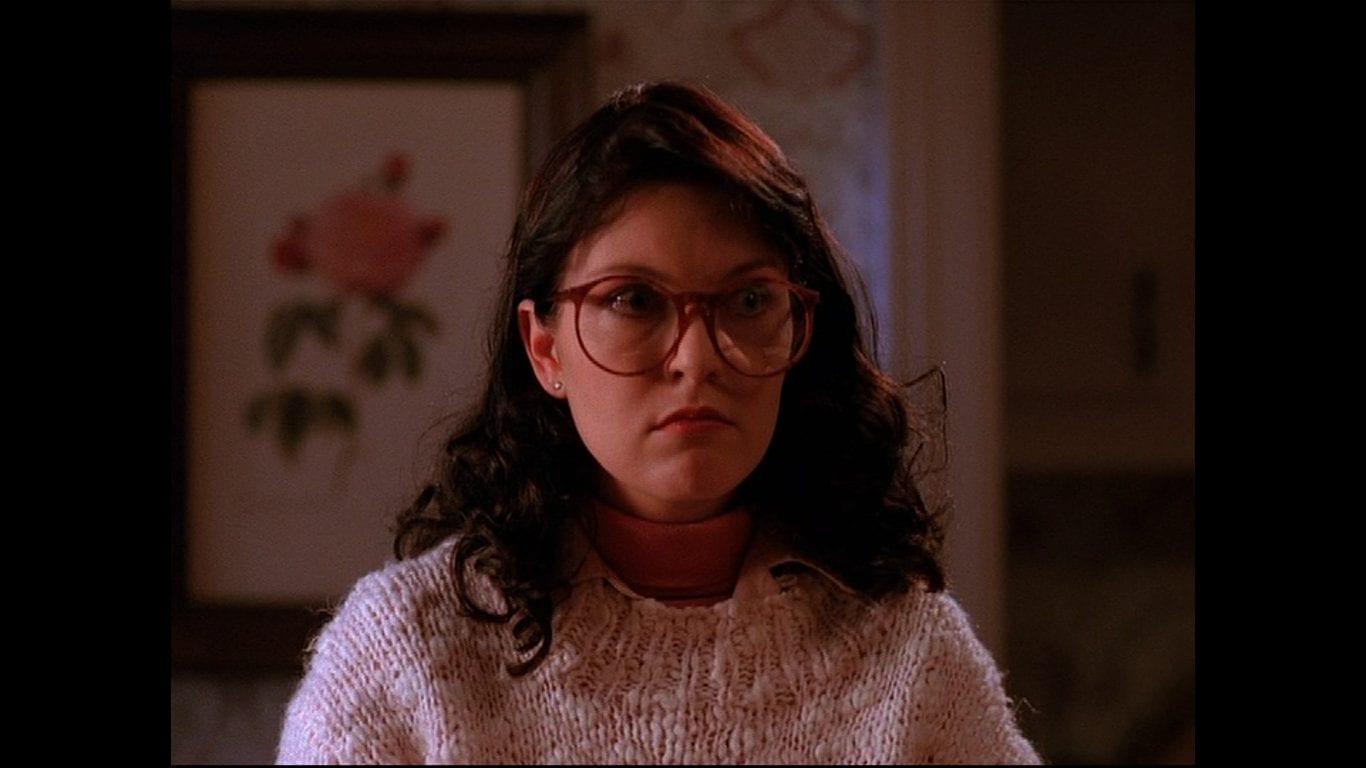
JS: I don’t really know where to start with Sheryl Lee and Twin Peaks, as there’s so much to talk about. We could literally spend hours talking about Laura and Maddy and Carrie, so I’ll instead ask what does Sheryl Lee mean to you regarding her work in Twin Peaks?
LS: Oh wow. Crap, that caught me off-guard. I think Laura Palmer is Twin Peaks. That’s not me being hyperbolic or trying to sound deep. I think she literally and figuratively is Twin Peaks. The show doesn’t exist without Laura’s abuse and rape and murder, and it doesn’t continue without the pain that her death caused in the community. That extends right through to The Return, which began each and every episode by zooming out of Laura’s homecoming photo (except in Part 1, which zoomed in on it). Just like in the original series when she was the last thing we saw in every episode with only a couple of exceptions. She’s right there, at the top (or bottom) of the hour, each and every time. And Sheryl Lee wholly embodied that role to the point that they are, in the appropriate parlance, one and the same. Could you imagine anyone else playing Laura Palmer or coming close to doing as good a job as Sheryl did? I certainly can’t… and I think it comes back to that depth I mentioned in your last question. Sheryl Lee is Laura Palmer is Twin Peaks.
JS: The importance of Laura Palmer and her entire arc from the original series through to The Return. The importance of Maddy Ferguson, the appearance of doppelgängers, and the revelation about Leland. And, of course, her introduction as Carrie Page. It’s impossible to talk about it all, but Sheryl Lee’s role in the world of Twin Peaks is arguably or maybe unarguably the most important. Not just as Laura, as everything that happens seemingly stems from the characters embodied by Sheryl Lee. So, with that in mind, what’s your take from the ending of Part 18?
LS: I’m on the record in many places, from the site to the Bickering Peaks podcast, about my feeling that the ending of Part 18 represents the failure of Agent Cooper to understand that his role in this story was never to “Save Laura,” as much as he wants it to be that way. Unless the ending of Fire Walk With Me hasn’t happened yet and Laura/Carrie hasn’t yet found her salvation, I can’t help but feel that the ending shows a fate altered by Cooper’s machinations to put Laura right back in harm’s way once again. And I don’t like that. The only theory that comes close to helping me feel better about the ending is David Auerbach’s pocket universe theory, but I can’t buy into it 100% because I don’t believe that Jowday/Judy even exists. In my opinion, she’s a conceptual entity at most, but probably nothing more than an idea.
I’m very open to suggestion on this front, of course, though no-one has produced a theory that doesn’t centralise and strengthen the role of Agent Cooper, and after FWWM it’s hard to imagine that there wouldn’t be some kind of feminine power stemming from Laura’s experience in that film at play at this particular juncture. Does it have to be that a man is the one to save everything? If so, why? You’ve got a powerful figure like Laura, possibly even imbued with golden energy from The Fireman (in that one particular theory) – why not use her to her fullest, complete with agency and thought and purposeful action, instead of being dragged to Twin Peaks, WA in a stranger’s car to perform some duty she doesn’t even know she’s supposed to perform?
I’m way off topic here, and I apologise, but yeah… the way I see it, the ending feels like an expression of futility at the nature of returning anywhere and the flawed logic that goes into thinking that returning to that place (wherever that is) is automatically the answer. Which could be read as a larger comment on nostalgia, perhaps, and the very idea of The Return anyway. But I digress…
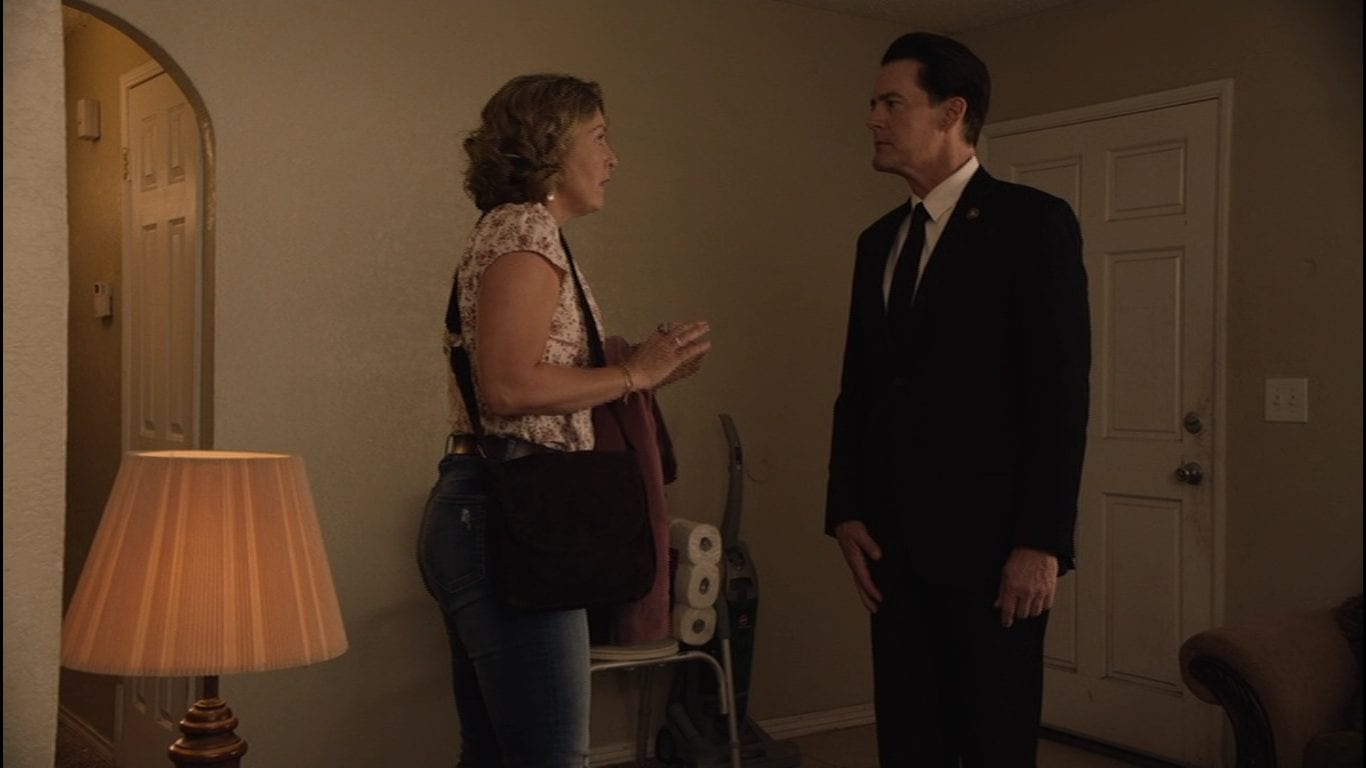
JS: Do you have a favourite Sheryl Lee moment from the entirety of Twin Peaks? For obvious reasons, I imagine most people will go for Fire Walk With Me because she’s simply remarkable in that film, but I happen to love the final two episodes of The Return. The way she effortlessly transformed into a teenage Laura Palmer then later emerged as Carrie Page really made me wish we had been gifted more of her throughout the revival, which is something I thought Mark Frost and David Lynch would’ve expanded on further.
LS: Yes, her Part 17/18 stuff was truly remarkable. I love Maddy though. Innocent but mature, sweet but sultry, and enough chutzpah to order a Cherry Coke and never finish it! I guess I couldn’t call her death scene my favourite, but it’s the most memorable, for sure.
JS: Other than her on-screen work in Twin Peaks, I have to mention the long-awaited and perfectly-timed release of The Secret Diary of Laura Palmer audiobook in May 2017. I had already read the book a bunch of times, but it was something else listening to the diary read aloud by Laura Palmer herself. Do you remember your thoughts on reading Jennifer Lynch’s novel for the first time, and have you had the quite surreal experience of listening to the audiobook yet?
LS: I recall reading the diary on the Glastonbury Grove site – green text on black background – shortly after watching the series for the first time. It didn’t affect me the same way Cooper’s autobiography did and I don’t know why. I think because Laura’s story has been so well told in FWWM that the revelations had less of an impact on me. Strange, hey? It wasn’t until years later that I reread the diary and was hit with just how tragic and scary it was. It’s a singular work of fiction; I can’t believe Jennifer Lynch was as young as she was when she wrote it! And then of course with the audiobook… which was so emotionally draining to listen to that I couldn’t finish more than 1/4 of it. I’m not some wilting flower who can’t handle the tough stuff, but something about hearing Sheryl Lee as BOB made the book so much harder to bear. It was real now, not just some work of fiction. And if that isn’t a testament to Sheryl Lee’s abilities then I don’t know what is. So yeah, my experience with that book has grown more and more difficult as I grow older.
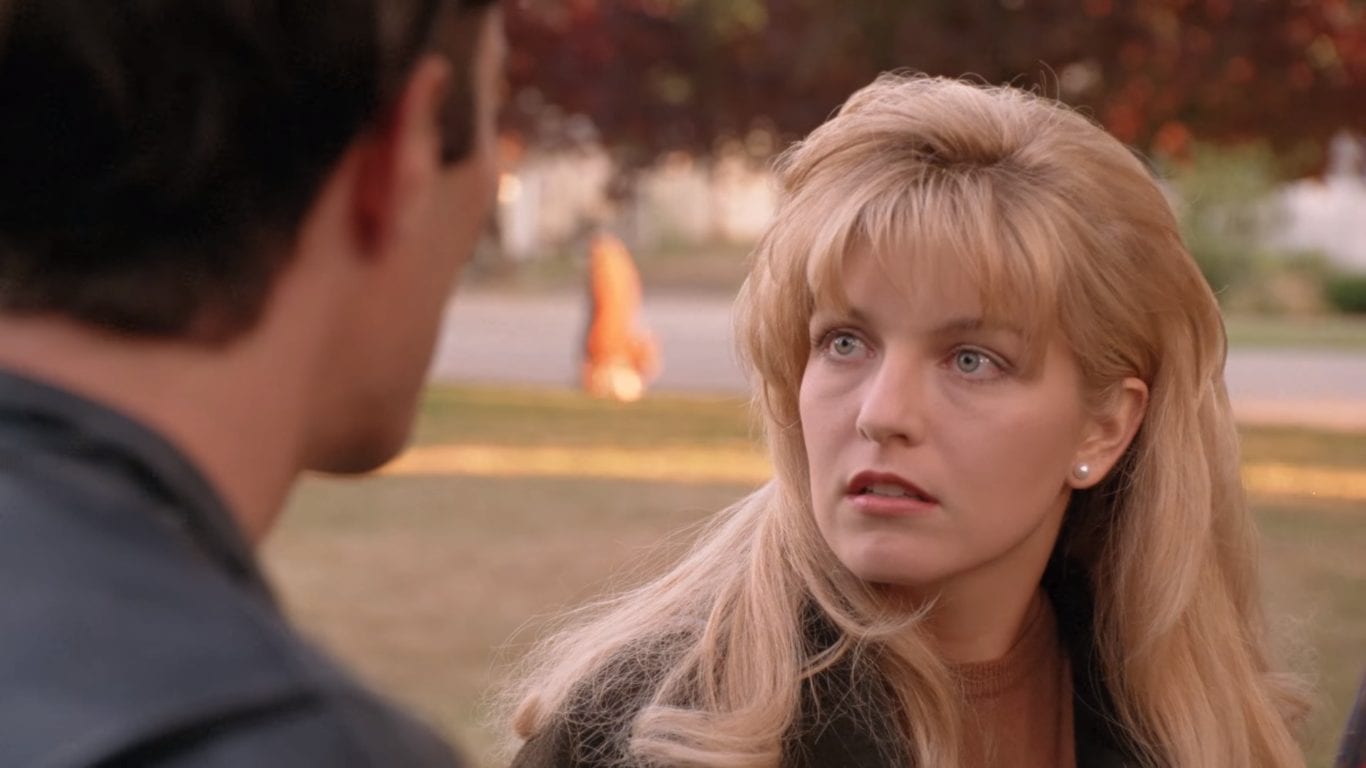
JS: What other performances/works have you enjoyed from Sheryl Lee’s career thus far? In recent years she’s popped up in smaller films like Winter’s Bone and Texas Killing Fields, both of which saw her given limited screen time, but I always enjoy seeing her nevertheless. She really makes the most out of every role, and always leaves you wanting to see more of that character, which is something that’s quite unique to only genuinely gifted performing artists.
LS: So, OK, this is a bit circuitous and maybe it’s getting into the realm of TMI, but Sheryl Lee looks and talks almost exactly like my psychologist, whom I’ve been seeing for several years. So, the role that stands out for me is her role as Dr. Donna Gooden in “Dual Spires,” the Twin Peaks-inspired episode of Psych. I think because she plays a doctor, and in that role, she reminds me even more of my therapist, so there’s this strange sort of kinship I guess, for lack of a better word, that I feel when I watch her in that role. I’ve watched that episode a dozen times. I love it.
JS: And finally, Lindsay, we’ve been here before. If you could recast any role from the history of film and TV with Sheryl Lee in their place, which character would you choose and why?
LS: Hoo boy… well… I think the obvious answer would be to have Sheryl Lee play another scream queen kind of film. She could play Marion Crane in Psycho or Carrie White in Carrie (a kind of a nice reversal from beloved homecoming queen in Twin Peaks, eh?) But when I really think about it, the role that seems like the best fit symbolically and thematically would be for her to play Judy Barton/Madeleine Elster in a remake of Vertigo, opposite an oddly off-putting leading man, someone like Benedict Cumberbatch (in a fantasy casting scenario, of course!) Like I said before, Sheryl has such range and depth, and as she’s already played Laura/Maddy/Carrie I think having her play dual roles in another film (one that inspired Twin Peaks, too) would be really cool to see. Although it does seem to typecast her a bit. But still… yeah, I think that would be my final answer.
Once again, I want to thank Lindsay for taking the time to join me for this latest edition of “As Seen on Twin Peaks.” So, you’ve read ours, but what are your thoughts on Sheryl Lee? Favourite roles, performances, works? Please leave a comment and let us know by following the information about our social media accounts, which can be found below. Alternatively, you can follow me on Twitter (@JonSheasby), and we’ll continue the conversation over there.


